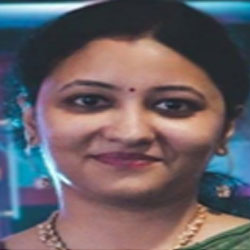
Swati Chandak
Present Position: Assistant Professor
Department of Journalism, School of Media and Communication
E-mail: swati.chandak@adamasuniversity.ac.in
Education:
- Pursuing PhD, (Adamas University)
- M.A. in Journalism and Mass Communication, (University of Calcutta)
- B.A. (Honours) in Journalism and Mass Communication, Shri Shikshayatan College, (University of Calcutta)
Research Key Areas:
- Communication Studies
- Media Studies
- New Media
- Social Media
Experience:
- Assistant Professor, Department of Journalism, School of Media and Communication, Adamas University
Research Publication (s):
- Number of invited Book-Chapters: 2
For Details, Visit: https://vidwan.inflibnet.ac.in/profile/163466
Selected Publication (s):
- Swati Chandak. Indian Web Series – A Study of Paradigm Shift in Gender Roles and Traditional TV. Gender Discourse and Youth in Media. ISBN 978-93-89484-49-6.
- Swati Chandak. Use of Media and Communication as a Catalyst for Social Change in Swachh Bharat Abhiyan. Communication for Social Change. ISBN: 978-93-5437-280-3
Research Advisor / Supervisor:
- Post Graduate Thesis Advisor : 15 (Awarded)
Award/ Academic Recognition/ Major Professional Activity:
- Best Paper Award for research paper presentation for ‘Rhetoric All Through The Itinerary of the West Bengal Assembly Election Campaign, 2021: Journey from ‘Vaam to Ram’ in International Conference on Strategic Communication organised by G.D. Goenka University on May 1, 2021 and May 2, 2021.
- Presented a research paper titled ‘The Use Of Artificial Intelligence In Journalism Practices – Future Trends’ in International Research to Practice Conference on Media Landscape of Russia and the World: Past Present and Future on April 14, 2020, which was organised by Peoples’ Friendship University of Russia.
- Presented a paper on ‘The effect of Facebook monetization on mainstream media’ in GEIST conference held at Adamas University in December 2019 and also received the 2nd best paper award.

